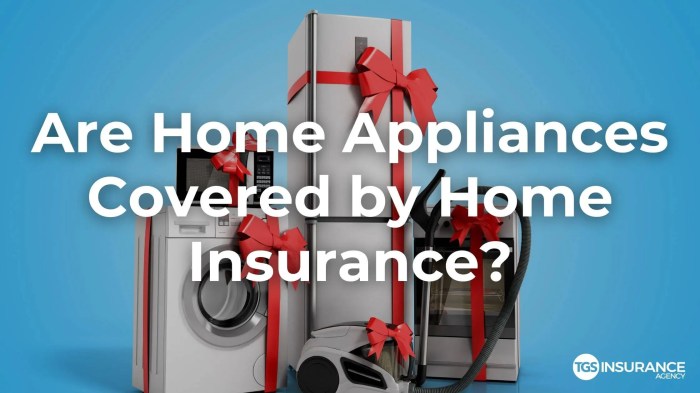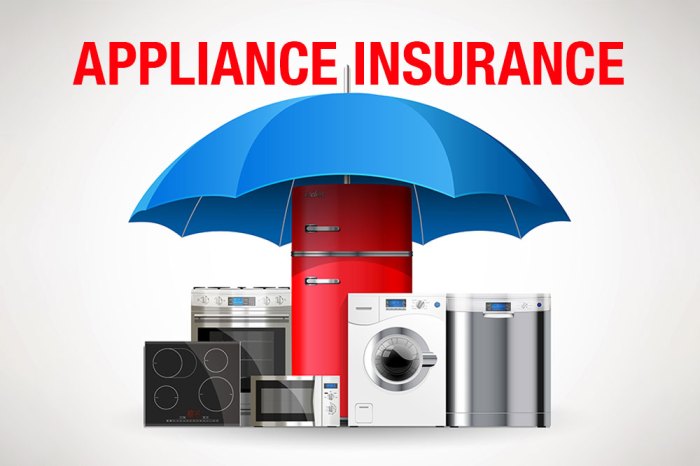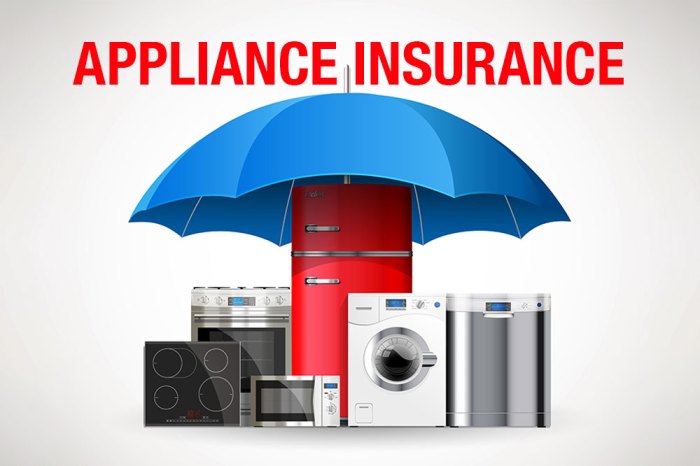Home appliance insurance stands as a safety net for your valuable household appliances, offering peace of mind and financial protection against unexpected breakdowns. Imagine the frustration of your refrigerator failing during a heatwave or your washing machine malfunctioning on laundry day.
Home appliance insurance steps in to alleviate such anxieties, providing repair or replacement coverage for a range of appliances, including refrigerators, ovens, washing machines, dryers, dishwashers, and more.
Understanding the nuances of home appliance insurance is crucial to make informed decisions. From the types of coverage and claim processes to the factors influencing costs, this guide aims to equip you with the knowledge to navigate this essential aspect of homeownership.
What is Home Appliance Insurance?

Home appliance insurance is a type of coverage that protects you against the financial burden of unexpected repairs or replacements for your major household appliances. It acts as a safety net, providing peace of mind knowing you’re covered in case of malfunctions, breakdowns, or even accidents.
Types of Appliances Covered
Home appliance insurance typically covers a wide range of essential appliances found in most homes. These often include:
- Refrigerators
- Washing machines
- Dryers
- Dishwashers
- Ovens
- Microwaves
- Freezers
- Stoves
- Garbage disposals
Some policies may also extend coverage to other appliances, such as water heaters, HVAC systems, and even certain types of home electronics. It’s crucial to review the specific terms and conditions of your policy to understand which appliances are included.
Benefits of Home Appliance Insurance
Home appliance insurance offers several key benefits that can make it a valuable investment for homeowners. These benefits include:
- Financial Protection:Appliance repairs and replacements can be expensive, and unexpected breakdowns can significantly impact your budget. Home appliance insurance helps alleviate this financial stress by covering the costs of repairs or replacement, preventing you from having to pay out-of-pocket.
- Peace of Mind:Knowing that you have insurance for your appliances can provide peace of mind. It eliminates the worry of unexpected breakdowns and the financial burden they can bring.
- Convenience:Many insurance providers offer convenient services, such as 24/7 access to customer support, quick claims processing, and even the option to choose a qualified repair technician from their network.
- Extended Warranty Coverage:Some home appliance insurance policies can extend the warranty period of your appliances, providing additional protection beyond the manufacturer’s warranty.
How Does Home Appliance Insurance Work?
Home appliance insurance protects you from unexpected repair or replacement costs when your covered appliances break down. It’s a type of insurance policy that offers financial assistance for covered repairs or replacements, giving you peace of mind and helping you avoid unexpected expenses.
Purchasing Home Appliance Insurance
You can typically purchase home appliance insurance through a variety of channels, including:
- Through the appliance retailer:Many appliance retailers offer insurance plans when you purchase a new appliance. This is often a convenient option, as you can add the insurance to your purchase at the same time.
- From a third-party insurance provider:Several specialized insurance companies offer appliance insurance plans. These plans may offer more flexible coverage options and may be a good choice if you’re looking for a plan that covers multiple appliances.
- As part of your homeowners or renters insurance:Some homeowners or renters insurance policies include appliance coverage as an optional add-on. This can be a cost-effective option if you already have a homeowners or renters policy.
Coverage Details
Appliance insurance policies vary in their coverage details, so it’s important to carefully review the policy terms before purchasing.
- Deductible:This is the amount you pay out-of-pocket for each claim. A higher deductible typically means a lower premium. Deductibles range from $50 to $250 or more.
- Coverage Limits:This is the maximum amount the insurance company will pay for a covered repair or replacement. Coverage limits can vary depending on the appliance and the policy. For example, a policy might cover up to $1,000 for a refrigerator or $500 for a washing machine.
- Exclusions:These are situations or events that are not covered by the policy. Common exclusions include damage caused by:
- Neglect or abuse
- Natural disasters (floods, earthquakes, etc.)
- Power surges
- Warranties
Claim Process
Here’s a general overview of the claim process:
- Report the claim:Contact your insurance company immediately when your appliance breaks down. Provide them with details about the issue and the appliance model.
- Get an assessment:The insurance company may require a qualified technician to assess the damage and determine if it’s covered under your policy.
- Receive compensation:If the damage is covered, the insurance company will pay for the repair or replacement, minus your deductible. You may need to provide receipts and documentation for the repair or replacement.
Benefits of Home Appliance Insurance
Home appliance insurance offers a range of benefits that can significantly enhance your peace of mind and protect your finances. It provides financial protection against unexpected repair or replacement costs, allowing you to avoid substantial out-of-pocket expenses.
Financial Protection
Home appliance insurance acts as a safety net, shielding you from the potentially significant financial burden associated with appliance breakdowns. When an appliance malfunctions, you can rely on your insurance policy to cover the costs of repair or replacement, ensuring that you’re not left with a large bill to pay.
For example, if your refrigerator suddenly stops working and needs a costly repair, your appliance insurance can help cover the expenses, preventing you from having to pay the entire amount yourself.
Peace of Mind
Knowing that your appliances are covered by insurance provides a sense of security and peace of mind. You can rest assured that if an appliance breaks down, you won’t be left scrambling to find the funds to repair or replace it.
This peace of mind allows you to focus on other important aspects of your life without the constant worry of unexpected appliance failures.
Cost Comparison
While appliance insurance does involve a monthly premium, it’s crucial to consider the potential costs of replacing a broken appliance. The cost of replacing a major appliance, such as a refrigerator, washer, or dryer, can easily reach several hundred or even thousands of dollars.
For instance, replacing a high-end refrigerator could cost you $2,000 or more. Appliance insurance, with its relatively modest monthly premiums, can help you avoid such significant expenses in the event of an appliance failure.
Types of Home Appliance Insurance Plans

Home appliance insurance plans offer different levels of coverage and costs to fit your needs and budget. Understanding the various types of plans can help you make an informed decision about which one is right for you.
Types of Home Appliance Insurance Plans
There are several different types of home appliance insurance plans available. Here’s a comparison table to help you understand the key differences:
| Plan Name | Coverage Details | Cost Factors | Pros | Cons |
|---|---|---|---|---|
| Single Appliance Coverage | Covers a specific appliance, such as a refrigerator, washing machine, or dryer. | Appliance type, age, and value. |
|
|
| Multiple Appliance Coverage | Covers multiple appliances in your home, such as refrigerators, washing machines, dryers, ovens, and dishwashers. | Number of appliances covered, age, and value. |
|
|
| Home Warranty | Covers a wide range of home systems and appliances, including HVAC, plumbing, electrical, and major appliances. | Home size, age, and location. |
|
|
Factors to Consider When Choosing Home Appliance Insurance
Choosing the right home appliance insurance plan can be a significant decision, as it directly impacts your financial protection in case of unexpected appliance breakdowns. To make an informed choice, you need to consider several key factors that will help you find a plan that aligns with your specific needs and budget.
Understanding Coverage Details
It is crucial to carefully examine the coverage details of each insurance plan you are considering. Understanding what is covered and what is excluded will help you determine if the plan meets your requirements. Pay close attention to the following aspects:
- Covered Appliances:Make sure the plan covers all the appliances you want to protect. Some plans may have specific limitations on the types of appliances covered, such as excluding older appliances or those exceeding a certain age.
- Covered Repairs and Replacements:Understand what types of repairs and replacements are included in the plan. Some plans may cover only specific types of repairs, such as mechanical breakdowns, while others may cover a wider range of issues, including accidental damage or power surges.
- Coverage Limits:Each plan will have a maximum coverage limit, which represents the maximum amount the insurer will pay for repairs or replacements. Ensure the coverage limit is sufficient to cover the cost of your appliances.
- Deductibles:You will likely need to pay a deductible, which is a fixed amount you pay out of pocket before the insurance company covers the remaining costs. The higher the deductible, the lower the premium, and vice versa. Choose a deductible you can afford while ensuring the remaining coverage is adequate.
Comparing Quotes from Different Insurance Providers
Once you have a clear understanding of your coverage needs, it’s essential to compare quotes from different insurance providers. This will help you find the best value for your money. Here are some tips for comparing quotes:
- Get Multiple Quotes:Contact several insurance providers and request quotes for similar coverage levels. This will allow you to compare premiums and coverage details side by side.
- Consider Discounts:Inquire about any available discounts, such as bundling discounts for multiple policies or discounts for homeowners who have good credit scores.
- Read the Fine Print:Carefully review the policy documents, including the terms and conditions, before making a decision. Pay attention to any exclusions or limitations that may not be immediately apparent.
Common Exclusions in Home Appliance Insurance
While home appliance insurance provides peace of mind, it’s essential to understand that certain situations are typically excluded from coverage. Knowing these exclusions helps you make informed decisions about your insurance needs and avoid surprises when you need to file a claim.
Common Exclusions
- Pre-existing Conditions:Appliance insurance policies usually won’t cover repairs or replacements for problems that existed before you purchased the policy. For example, if your refrigerator had a faulty compressor that started malfunctioning before you got the insurance, you likely won’t be covered for its repair or replacement.
- Normal Wear and Tear:Insurance typically doesn’t cover routine maintenance or repairs related to the natural wear and tear of an appliance. This means things like replacing a worn-out belt in a washing machine or a burnt-out light bulb in your oven are not covered.
- Cosmetic Damage:Appliance insurance usually focuses on functional issues rather than cosmetic ones. Scratches, dents, or minor cosmetic imperfections are generally not covered.
- Improper Use or Installation:Using an appliance for purposes other than its intended use or improper installation can void coverage. For instance, using your washing machine to clean rugs or not properly connecting the appliance to power could lead to a denied claim.
- Acts of God:Events like floods, earthquakes, or lightning strikes are often excluded from appliance insurance policies. These events are typically covered by separate homeowners or renters insurance.
- Negligence:If damage to your appliance results from your negligence, like leaving a faucet running and flooding your kitchen, your insurance may not cover the repair or replacement.
- Warranties:Appliances often come with manufacturer warranties. Appliance insurance may not cover repairs or replacements that are already covered under the manufacturer’s warranty.
Examples of Exclusions
- Your dishwasher breaks down because the drain hose is clogged. This is considered normal wear and tear and is not covered by insurance.
- Your refrigerator stops working due to a power surge during a thunderstorm. While the power surge may be covered by your homeowners insurance, the damage to the refrigerator may not be covered by your appliance insurance.
- You use your oven to dry clothes and it malfunctions. This is considered improper use and would likely not be covered by your insurance.
Reading Your Policy Carefully
It’s crucial to carefully read your home appliance insurance policy to understand its specific exclusions. This ensures that you’re aware of the limitations of your coverage and can make informed decisions about your insurance needs.
Tips for Saving Money on Home Appliance Insurance
Home appliance insurance can be a valuable investment, but it can also be costly. By implementing a few strategies, you can significantly reduce your insurance premiums without compromising coverage.
Bundling Insurance Policies
Bundling your home appliance insurance with other policies, such as homeowners or renters insurance, can often lead to substantial savings. Insurance companies often offer discounts for bundling multiple policies, as they see you as a more valuable customer.
Choosing a Higher Deductible
Opting for a higher deductible can lead to lower premiums. A deductible is the amount you pay out-of-pocket before your insurance coverage kicks in. By agreeing to pay a higher deductible, you signal to the insurance company that you are willing to take on more risk, which translates to lower premiums.
Comparing Quotes
Before committing to a specific insurance provider, it’s crucial to compare quotes from multiple companies. This allows you to identify the most competitive rates and coverage options available. Online comparison tools can simplify the process and help you find the best deal.
Negotiating with Insurance Providers
Don’t be afraid to negotiate with insurance providers. If you have a good credit score, a history of on-time payments, or are willing to bundle multiple policies, you may be able to secure a lower premium. Be prepared to explain your reasons for requesting a discount and be polite and respectful throughout the negotiation.
Alternatives to Home Appliance Insurance
While home appliance insurance offers a safety net against unexpected breakdowns, it’s not the only way to protect your investments. Several alternatives exist, each with its own set of benefits and drawbacks. Consider these options before committing to appliance insurance:
Extended Warranties
Extended warranties, also known as service contracts, provide additional coverage beyond the manufacturer’s standard warranty. They typically cover repairs or replacements for defects or malfunctions that occur after the initial warranty expires.
- Benefits:Extended warranties can provide peace of mind, knowing that you have coverage for unexpected repairs. They may also cover parts and labor costs, saving you money on repairs.
- Drawbacks:Extended warranties can be expensive, especially for high-end appliances. They may also have limitations on what they cover, such as exclusions for certain types of damage or repairs.
- Suitable Scenarios:Extended warranties can be beneficial for appliances with a high risk of failure, such as refrigerators, washing machines, and dryers. They can also be a good option if you plan to keep the appliance for a long time.
Appliance Maintenance Plans
Appliance maintenance plans offer regular checkups and preventative maintenance services for your appliances. These plans can help identify potential problems early on, preventing major breakdowns and costly repairs.
- Benefits:Appliance maintenance plans can help extend the lifespan of your appliances and reduce the likelihood of unexpected breakdowns. They can also save you money on repairs in the long run.
- Drawbacks:Appliance maintenance plans can be expensive, especially if you have multiple appliances. They may also have limitations on the types of services they cover.
- Suitable Scenarios:Appliance maintenance plans are a good option for homeowners who want to proactively maintain their appliances and prevent costly repairs. They can also be beneficial for older appliances that are more prone to breakdowns.
Emergency Funds
Setting aside an emergency fund specifically for appliance repairs can be a viable alternative to insurance. This allows you to pay for repairs out of pocket without relying on insurance coverage.
- Benefits:Emergency funds provide flexibility and control over how you spend your money. You can use the funds for any appliance repair, regardless of whether it’s covered by insurance.
- Drawbacks:Building an emergency fund can take time and discipline. You may not have enough funds to cover a major appliance repair if it occurs unexpectedly.
- Suitable Scenarios:Emergency funds are a good option for homeowners who are financially responsible and have a good savings habit. They can also be a suitable alternative for appliances that are relatively inexpensive to repair.
Home Appliance Insurance in Different Countries
Home appliance insurance, while prevalent in many countries, exhibits significant variations in its availability, coverage, cost, and regulatory landscape. These differences stem from factors such as consumer demand, insurance market dynamics, and local regulations.
Home Appliance Insurance Availability and Coverage
The availability and coverage of home appliance insurance vary greatly across countries. In some regions, it is a widely available and popular product, while in others, it may be less common or even nonexistent.
- United States:Home appliance insurance is readily available in the United States, often bundled with homeowner’s insurance or offered as a standalone policy. Coverage typically includes repair or replacement for major appliances like refrigerators, ovens, washing machines, and dryers.
- United Kingdom:In the UK, home appliance insurance is also widespread, typically offered as part of a comprehensive home insurance policy or as a separate add-on. Coverage often extends to various appliances, including dishwashers, microwaves, and even small appliances like coffee makers.
- Canada:Similar to the US, home appliance insurance is prevalent in Canada, frequently bundled with home insurance policies. Coverage generally includes repairs or replacements for major appliances and sometimes extends to smaller appliances.
- Australia:In Australia, home appliance insurance is available but less common than in some other developed countries. Coverage often focuses on major appliances like refrigerators, ovens, and washing machines.
- Germany:In Germany, home appliance insurance is available but less prevalent than in the UK or US. Coverage typically focuses on major appliances and often includes repair and replacement options.
Home Appliance Insurance Costs
The cost of home appliance insurance varies depending on several factors, including the country, the insurer, the type of coverage, and the age and value of the appliances.
- United States:In the US, the average cost of home appliance insurance can range from $10 to $50 per month, depending on the chosen coverage and the insurer.
- United Kingdom:In the UK, the cost of home appliance insurance can vary, but it typically falls between £5 and £20 per month.
- Canada:The cost of home appliance insurance in Canada can range from $10 to $40 per month, depending on the coverage and the insurer.
- Australia:In Australia, the cost of home appliance insurance can vary but is generally comparable to other developed countries, ranging from $10 to $40 per month.
- Germany:In Germany, the cost of home appliance insurance can vary but typically falls between €5 and €20 per month.
Home Appliance Insurance Regulations
Home appliance insurance is subject to various regulations in different countries, impacting the terms and conditions of the policies.
- United States:In the US, home appliance insurance is regulated at the state level, with each state having its own set of rules and requirements. These regulations may cover aspects such as the scope of coverage, the exclusions, and the claims process.
- United Kingdom:In the UK, home appliance insurance is regulated by the Financial Conduct Authority (FCA), which sets standards for consumer protection and fair treatment. The FCA’s regulations cover aspects such as the clarity of policy terms, the handling of complaints, and the disclosure of information.
- Canada:In Canada, home appliance insurance is regulated by provincial and territorial insurance regulators. These regulators oversee the insurance industry, ensuring that insurers operate fairly and transparently.
- Australia:In Australia, home appliance insurance is regulated by the Australian Securities and Investments Commission (ASIC), which sets standards for financial services, including insurance. ASIC’s regulations cover aspects such as the disclosure of product information, the handling of claims, and the protection of consumer rights.
- Germany:In Germany, home appliance insurance is regulated by the Federal Financial Supervisory Authority (BaFin), which oversees the financial services industry. BaFin’s regulations cover aspects such as the terms and conditions of insurance policies, the handling of claims, and the protection of consumer rights.
Future Trends in Home Appliance Insurance
The home appliance insurance market is evolving rapidly, driven by technological advancements, growing environmental concerns, and changing consumer preferences. These factors are reshaping how insurers approach coverage, pricing, and customer engagement.
Impact of Technology
Technology is playing a pivotal role in transforming the home appliance insurance landscape. The rise of smart appliances, connected devices, and the Internet of Things (IoT) is creating new opportunities for insurers to provide more tailored and proactive services.
- Predictive Maintenance:Insurers can leverage data from smart appliances to identify potential problems before they occur, allowing for timely maintenance and reducing the risk of costly repairs. This can be achieved through sensors that monitor appliance performance and alert users or insurers of potential issues.For example, a smart refrigerator could send alerts if its temperature fluctuates or its compressor starts to malfunction.
- Remote Diagnostics:Remote diagnostics enable insurers to assess appliance problems remotely, reducing the need for physical inspections and accelerating the claims process. This can be done through apps that connect to appliances and provide real-time data on their performance. For example, a user could report a washing machine malfunction through an app, and the insurer could remotely diagnose the problem and guide the user through troubleshooting steps.
- Personalized Coverage:Data from smart appliances can be used to create personalized insurance plans that cater to individual needs and usage patterns. For example, a user who frequently uses their washing machine could opt for a plan with higher coverage limits for laundry appliances.
Sustainability and Green Initiatives
Growing concerns about environmental sustainability are influencing the home appliance insurance industry. Insurers are increasingly offering incentives for eco-friendly appliances and promoting sustainable practices.
- Discounts for Energy-Efficient Appliances:Insurers are offering discounts to policyholders who purchase energy-efficient appliances, encouraging the adoption of sustainable technologies. These discounts can incentivize consumers to invest in appliances with lower energy consumption and reduce their environmental footprint.
- Repair-Over-Replace Policies:Insurers are promoting repair-over-replace policies, encouraging the repair of appliances rather than immediate replacement. This approach aligns with sustainability goals by extending the lifespan of appliances and reducing waste.
- Green Claims Handling:Insurers are adopting environmentally responsible practices in their claims handling processes, such as using recycled materials for packaging and promoting electronic claims submission.
Changing Consumer Behavior
Consumer behavior is also evolving, impacting how they perceive and interact with home appliance insurance.
- Demand for Convenience:Consumers are seeking convenient and hassle-free insurance experiences, such as online quote generation, digital claims submission, and instant policy updates.
- Focus on Value:Consumers are increasingly price-sensitive and demand value for their insurance premiums. They are looking for plans that offer comprehensive coverage at competitive prices.
- Emphasis on Transparency:Consumers are seeking transparency in insurance policies, with clear and concise language explaining coverage details, exclusions, and pricing structures.
Future of Coverage and Pricing
The future of home appliance insurance is likely to see significant changes in coverage and pricing models.
- Modular Coverage:Insurers may offer modular coverage options, allowing consumers to customize their plans based on their specific needs and appliance types. For example, a user could choose to cover only their high-value appliances or opt for additional coverage for specific risks.
- Usage-Based Pricing:Usage-based pricing models could become more prevalent, where premiums are based on actual appliance usage patterns. This could offer more accurate pricing and incentivize consumers to use their appliances responsibly. For example, a user who uses their washing machine frequently could pay a higher premium than someone who uses it less often.
- Bundled Insurance Packages:Insurers may offer bundled insurance packages that cover multiple appliances or combine home appliance insurance with other types of insurance, such as home insurance or renters insurance. This could offer consumers convenience and cost savings.
End of Discussion
Ultimately, the decision to purchase home appliance insurance rests on your individual needs and circumstances. Weighing the cost of insurance against the potential expense of replacing a broken appliance, and considering your risk tolerance, can help you determine if this financial safeguard is right for you.
As you navigate the complexities of home appliance insurance, remember to compare quotes, understand the fine print, and choose a plan that best aligns with your budget and appliance protection needs.
Clarifying Questions
What is the typical coverage period for home appliance insurance?
Coverage periods vary depending on the insurance provider and plan, but typically range from one to five years.
Can I purchase home appliance insurance for appliances I already own?
Yes, you can usually purchase home appliance insurance for existing appliances, though there may be age restrictions.
What happens if my appliance is deemed unrepairable?
Most home appliance insurance policies will cover the cost of replacing a damaged appliance if it is deemed unrepairable, up to a certain limit.
How do I file a claim for home appliance insurance?
The claim process typically involves contacting your insurance provider, providing details of the damage, and following their instructions for submitting a claim.




